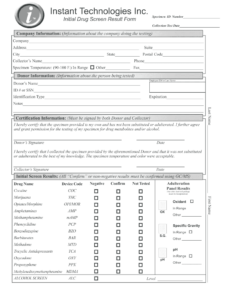5 Tips for Managing Drug Test Paperwork

Navigating the Labyrinth of Drug Testing Paperwork

Managing drug testing paperwork can be a daunting task, especially in industries where regular drug tests are mandatory. Whether you’re a human resources professional, an employer, or an individual subject to frequent drug tests, understanding how to effectively manage this paperwork is crucial. Let’s delve into five actionable tips that can streamline this process, reduce administrative overhead, and ensure compliance with regulatory requirements.
1. Organize Records Digitally

The first step in managing drug test paperwork effectively is to go digital. Paper documents are prone to misplacement, damage, and loss, which can result in severe repercussions for both employees and employers.
- Implement a Document Management System (DMS): A DMS can help you store, track, and manage documents. Software like SharePoint or Google Drive allows multiple users to access and update documents, facilitating collaboration and document control.
- Use E-signatures: Digital signatures reduce the time spent waiting for physical document signing, speeding up the process. Services like DocuSign or Adobe Sign make this straightforward.
- Backup Everything: Ensure all digital files are backed up regularly, either on cloud services or external drives, to prevent data loss.
2. Standardize Documentation

Standardization is key to reducing errors and ensuring consistency in drug testing procedures. Here’s how you can achieve this:
- Use Templates: Create standardized forms for consent, notification, results, and disputes. This not only helps in maintaining a uniform format but also in compliance with legal standards.
- Policy Document: Develop a clear drug testing policy document that outlines the procedure, rights, and responsibilities. Make sure this document is accessible and understandable by all employees.
- Checklists: Implement checklists for each step of the drug testing process to ensure all necessary paperwork is completed and filed correctly.
3. Secure Storage and Privacy Compliance

Drug testing results are highly sensitive information. Here are some strategies to keep this information secure:
- Secure Physical Storage: If you must keep paper records, ensure they are stored in a locked, secure cabinet or safe.
- Encrypt Digital Files: Encrypt all digital documents containing personal health information (PHI) or drug test results to prevent unauthorized access.
- Compliance with Regulations: Familiarize yourself with laws like HIPAA in the U.S., which mandate how PHI should be handled. Similar regulations exist in other countries as well.
- Access Control: Limit who can view or handle drug test results to only those with a legitimate need.
🔒 Note: Confidentiality breaches can lead to legal issues; always ensure compliance with privacy laws.
4. Implement an Audit System

Regular audits are indispensable to ensure the integrity of your drug testing program and to detect any discrepancies or non-compliance:
- Schedule Regular Audits: Establish a routine, say quarterly, to review all drug testing documentation for accuracy and completeness.
- Train Staff on Audit Procedures: Staff involved should know how to conduct audits, looking for completeness, timeliness, and compliance with internal policies and external regulations.
- External Audits: Occasionally consider third-party audits to provide an impartial review and identify any systemic issues.
5. Educate Employees and HR Staff

Education is not just about understanding the process; it’s about creating a culture of awareness and compliance:
- Regular Training Sessions: Hold sessions to educate employees on the drug testing policy, why it exists, how it’s conducted, and what the results mean.
- HR and Management Training: Ensure HR and management are well-informed about legal requirements, proper documentation handling, and how to respond to disputes or concerns about the drug testing process.
- Feedback Mechanism: Implement a system where employees can provide anonymous feedback on the drug testing process, which can help improve procedures.
In summary, managing drug test paperwork is not just about keeping records; it’s about safeguarding sensitive information, ensuring compliance, and promoting a fair workplace. By adopting digital solutions, standardizing procedures, securing data, performing regular audits, and educating stakeholders, you can effectively manage this intricate aspect of your HR responsibilities. Effective management of drug test paperwork ensures not only legal compliance but also builds trust within your organization.
What happens if we lose drug test records?

+
Losing drug test records can lead to legal issues, fines, and a loss of trust from employees. It’s crucial to implement secure storage solutions and backup systems to avoid such scenarios.
Can drug test results be shared with other companies?

+
Sharing drug test results with other entities typically requires the explicit consent of the individual tested, barring specific legal exceptions. Ensure compliance with privacy laws like HIPAA before any disclosure.
How long should drug test records be kept?

+
The retention period for drug test records varies by jurisdiction but generally ranges from one to seven years. Consult local laws or your company policy to determine the appropriate duration.
What should we do if an employee disputes their drug test result?

+
Provide them with the opportunity to retest, usually at their expense. Establish clear procedures for disputes, ensuring fairness and transparency in the process.